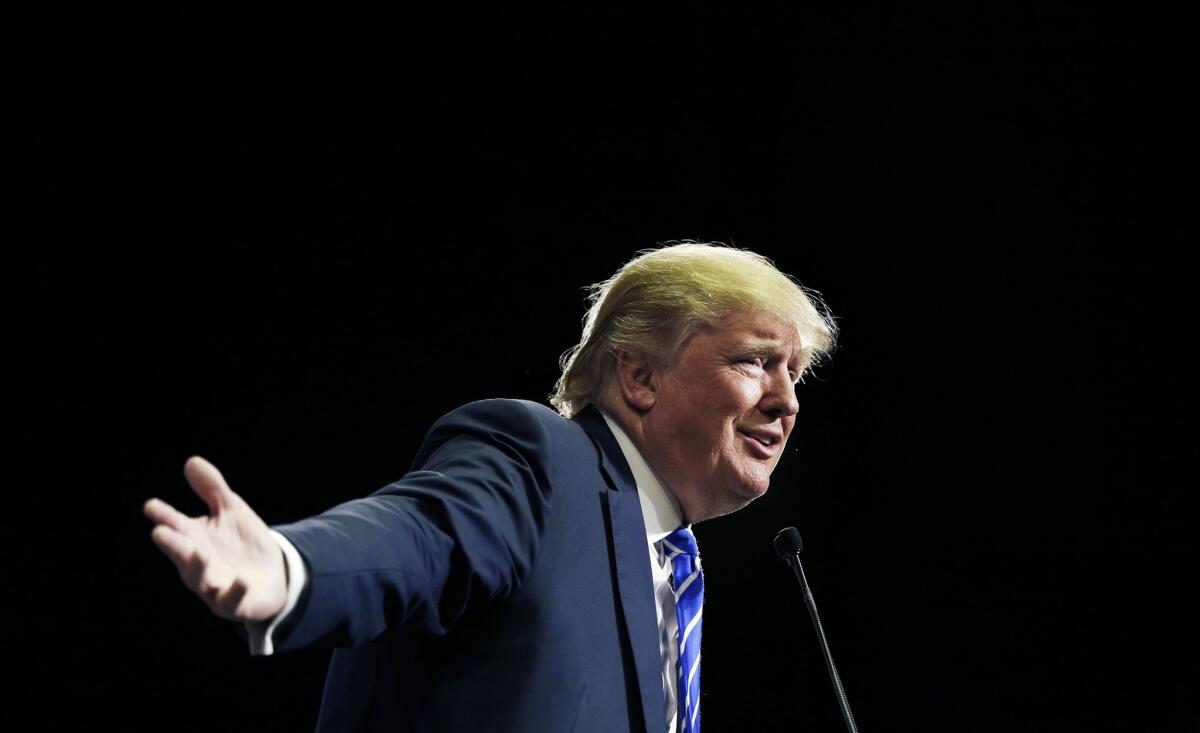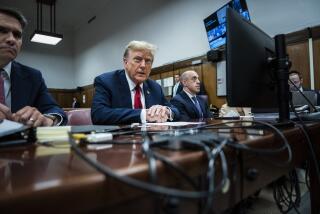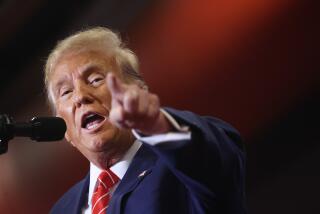If Trump testifies, he could settle the impeachment mess once and for all

- Share via
The Constitution vests the Senate with the “sole power” to hold President Trump’s impeachment trial. Current Senate rules call for minimal proceedings: No witnesses required and senators sitting silently as jurors. Meanwhile, the cause of the impeachment mess, the president, will be tweeting happily, even ferociously, from a distance. But Trump could radically change the course of the proceedings by appearing in person in the Senate, which would be his right.
Democrats and Republicans remain deadlocked over adding new procedures for the Trump trial. House Speaker Nancy Pelosi is refusing to transfer the articles of impeachment or appoint managers to present the case until “we see the process that is set forth in the Senate.” She hopes to reinforce Senate Minority Leader Charles E. Schumer’s call for witnesses who didn’t appear during the House investigation.
Senate Majority Leader Mitch McConnell has rejected Schumer’s proposals, and he is reportedly prepared to put the current rules into effect with no Democratic votes. He portrays Pelosi’s move as conceding her weak case, which Republicans believe was rushed to a vote. “The prosecutors appear to have developed cold feet,” he said. Pelosi responded with her own dig: “I don’t think they [the Founders] suspected we could have a rogue president and a rogue leader in the Senate at the same time.”
Trump could settle the fighting over the trial — and more — if he made available the only witness who truly matters: himself. Among its arcane impeachment rules, the Senate delivers a writ of summons to the president that calls on him to appear but imposes no penalty if he does not. Should Trump decide to become the first president to appear at his own impeachment trial, he would introduce a new variable into our chaotic national politics that might end the efforts to oust him once and for all.
The central issue in the impeachment is determining the motive behind Trump’s July 25 phone call with the president of Ukraine. Why did Trump say to Volodymyr Zelensky: “I would like you to do us a favor,” and then ask him to look into whether Joe Biden had pressured a Ukrainian prosecutor to stop investigating his son Hunter? Trump claims he wanted to fight corruption in Ukraine before releasing nearly $400 million in U.S. foreign and military aid. The House claims that Trump was pressuring Zelensky for political dirt to use against his strongest opponent in the 2020 election.
The framing of the articles of impeachment makes motive crucial. The charges do not include bribery or any other federal crime, but rather abuses of power. In the absence of a federal crime, abuse of power charges could fulfill the Founders’ fear that Congress might wield impeachment improperly, trying to control the executive over simple policy disputes or to achieve political supremacy. For the Senate to find a truly impeachable abuse of power, it must decide whether Trump was fishing for political intelligence that would help him win reelection instead of sincerely asking Ukraine to take steps against corruption.
Trump’s advisors no doubt would discourage him from showing up in the Senate chamber and breaking with precedent, which holds against one branch of government forcing another to appear before it. They would tell him not to waive executive privilege, though as president it is his to waive.
Trump’s direct participation in the Senate trial would blur the lines between roles as a defendant/witness and that of legal representative, much like a defendant representing himself in a criminal court. It would still be up to the Senate to establish the rules of such an appearance; could House managers or even senators cross-examine or debate him, for example, and could the Senate call other witnesses.
It’s possible that Trump would simply lie about Ukraine to the Senate, just as he has misrepresented other aspects of his public and private life. But even if Trump were to dissemble, that in itself would be important. Not only would senators be able to judge Trump’s credibility after looking him in the eye as he speaks, but so would the public. The Founders believed that the ultimate verdict on a president’s fitness should come at the ballot box.
Would Trump ignore precedent and legal advice? He has shown little reluctance to disregard traditions of presidential conduct, and he may find the advantages in this situation too tempting to resist. The gathered senators, and a televised trial, represent just the kind of captive audience he loves. He could ensure that he, not the Democratic primary candidates, remains at the center of public attention even as the Iowa caucuses loom. His appearance might garner for Trump, the reality TV star, television ratings higher than the Super Bowl.
More important, the president’s answers to the charges against him, in sworn testimony or in a closing argument, could truly clarify his motives. It would be a spectacle for certain, but it might also finally answer the Ukraine question, as the Senate and the voters decide his fate.
John Yoo is a professor at UC Berkeley Law School, a visiting scholar at the American Enterprise Institute and a visiting fellow at the Hoover Institution.
More to Read
A cure for the common opinion
Get thought-provoking perspectives with our weekly newsletter.
You may occasionally receive promotional content from the Los Angeles Times.









